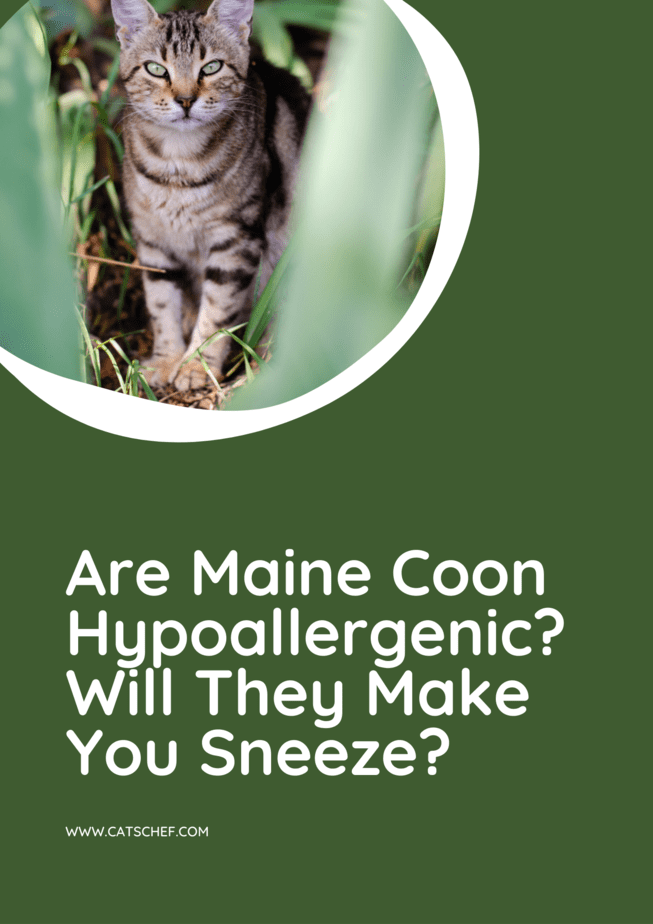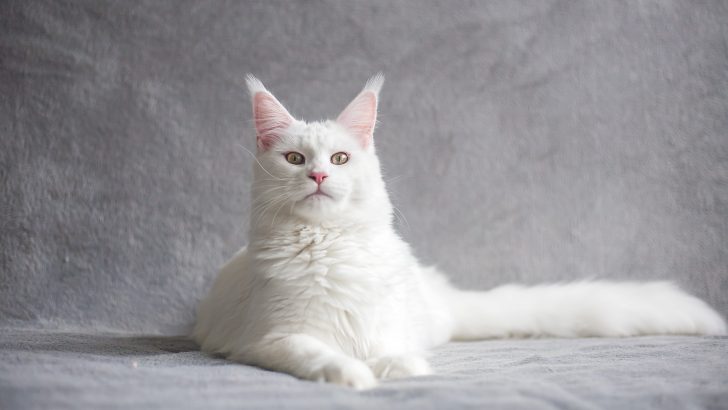“Are Maine Coon hypoallergenic?” you think to yourself as you try to stuff your nose with enough tissues to stop you from dripping on your T-shirt. “How could this happen!? How could I have forgotten to check whether I’m allergic to cats before getting one!?” You can’t help but freak out.
“Everything’s going to be fine,” you try to ease your mind that’s going crazy over something you never thought would happen. You had many pets growing up – birds, hamsters, even a dog. But you never experienced being unable to catch your own breath because of them.
You thought getting a four-legged friend would make your life better. But, now you’re facing the harsh reality – spending most of your days sneezing, drooling, and dripping out of every orifice of your body. “There has to be a way for the two of us to live under the same roof!” you mutter.
You’ve already fallen head over heels for this creature. She’s the most loving, affectionate, and gentle giant you’ve ever met. She’s brought so much happiness into your otherwise boring existence. You can’t imagine going back to your mundane routine established before her.
It seems that “Are Maine Coon hypoallergenic?” should have been the first thing you found out. But you were more distracted by the sheer amount of fluff she had wrapped around her head. Now, you have nothing left to do but turn to the internet and hope for the best.
We won’t beat around the bushes, buddy – Maine Coons aren’t hypoallergenic. Actually, none of the breeds is 100% hypoallergenic.
Whether they’re long-haired, short-haired, or even hairless like the Sphynx, they’re bound to secrete a certain amount of allergens. That’s not to say that you can’t hang out with them, though.
What are Main Coons, and what makes them the “gentle giants” of the feline world?
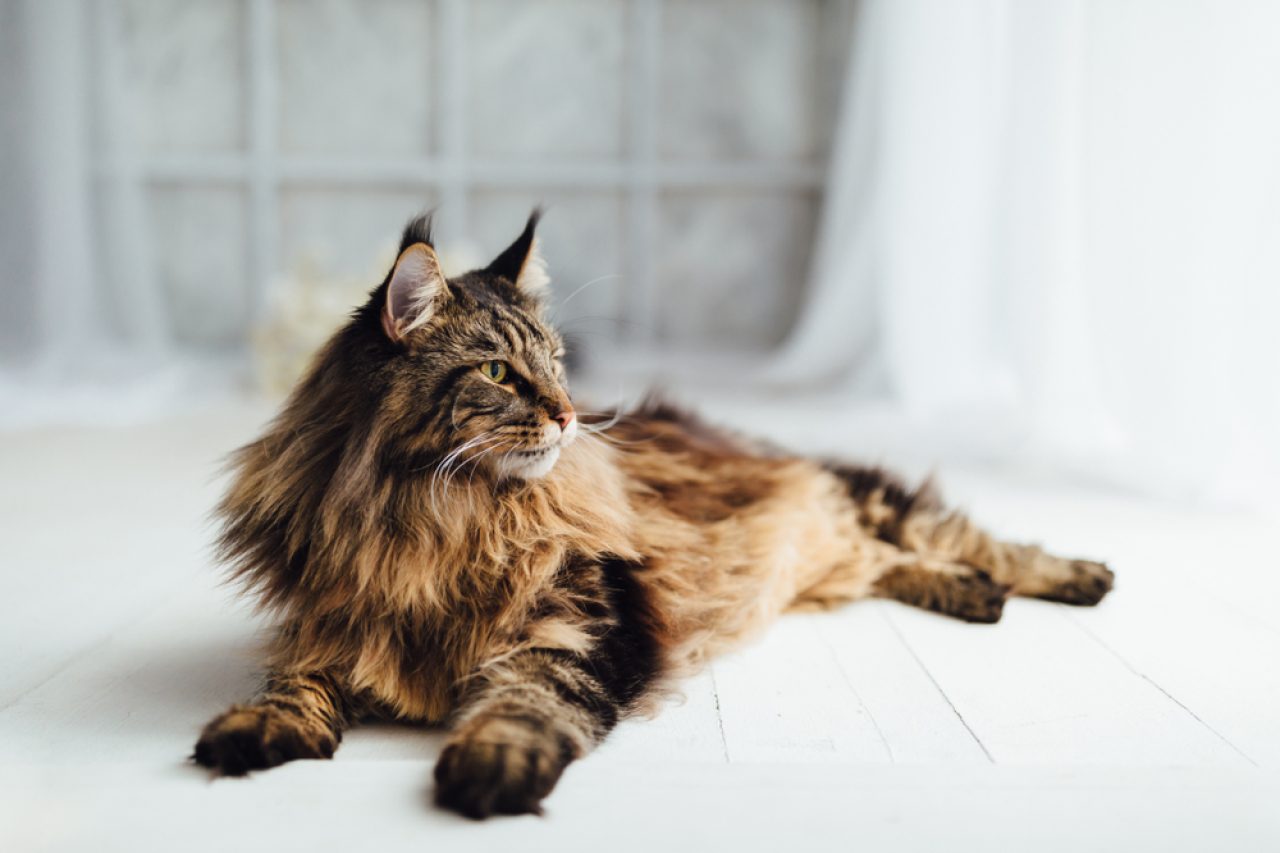
We can’t get into the hows and whys of whether Maine Coons are hypoallergenic without touching on what these beautiful beasts even are, right? Maine Coons are one of the most popular cat breeds, and we’re here to give you the scoop on how that came to be.
First things first, the origins of the Maine Coon are pretty blurry to most humans. While you might think “Well, they obviously come from Maine, hence the name Maine Coon!” that wouldn’t necessarily be the truth. There’s a part of the history of the Coon missing, and that’s the part prior to mating in Maine.
Thank goodness, there are myths and legends galore of Coon’s origins. There’s the one of it being a combination of a raccoon and a cat, Marie Antoinette’s escaped Turkish Angora gone wild upon arriving at the American ground, or even a certain captain Charles Coon’s mouser.
Whatever the case, Maine Coons came to be one of the most popular breeds among humans. They’re affectionate, gentle giants that deserve the title they carry. They are the embodiment of a family feline that’s happy to bring nothing but love to the household.
As for their appearance, Maine Coons aren’t your regular, easy-to-pick-up tabby cats. They’re pretty large as they can grow anywhere from 10 to 16 inches and 8 to 18 pounds. They’re almost the same measurement as the average bobcat. And, you don’t see that many humans sporting bobcats in their backyard, do you?
Maine Coons are pretty fluffy, too. They’re some of the fluffiest felines out of the bunch, and that’s pretty great because the amount of fur they sport makes them look even bigger. And, we can’t forget about the fact that their fluff comes in multiple colors and patterns. (They’re closer to unicorns than you might think!)
What are the causes of Maine Coon sneeze fests, and why do they happen to me?
“Are Maine Coon hypoallergenic?” you ask. “What does hypoallergenic mean to you?” we ask back. This little imaginary interaction is meant to illustrate that a lot of pet parents don’t really know what hypoallergenic means.
For example, they stumble upon an article that tells them that the Sphynx cats are hypoallergenic and they assume that the Sphynx can’t cause them to sneeze uncontrollably for three days straight. That’s not the case – the Sphynx (or any other cat, for that matter) isn’t 100% hypoallergenic.
So, hypoallergenic doesn’t mean that your feline friend won’t evoke a sneezing marathon. Hypoallergenic means that she’s less likely to send you to the ER than other felines, which would sound great if you were prone to a tiny thing of allergens affecting you anyway.
And actually, a feline’s fur isn’t the only source of allergens. That’s a pretty common misconception because most people start sneezing when they catch a glimpse of a feline’s fur flying across the room.
But, the urine, saliva, and dander (dead skin particles) are what should take most of the heat. These contain the highest amount of protein known as Fel d1. This protein is the reason you start drooling, sneezing, and wheezing the moment a cat (Maine Coon, or otherwise) enters the room.
This protein is secreted by the sebaceous glands, which means that urine, saliva, and dander aren’t the only sources. We can’t forget about (equally important) sources such as tears, mucous, poop, skin, and fur. And, limiting your exposure to these sources should be a telltale sign of whether you’re allergic to your Coon or not.
But why are Maine Coon cats not hypoallergenic then? Without further ado, here’s the intel we’ve gathered!
Why are Maine Coon cats not hypoallergenic?
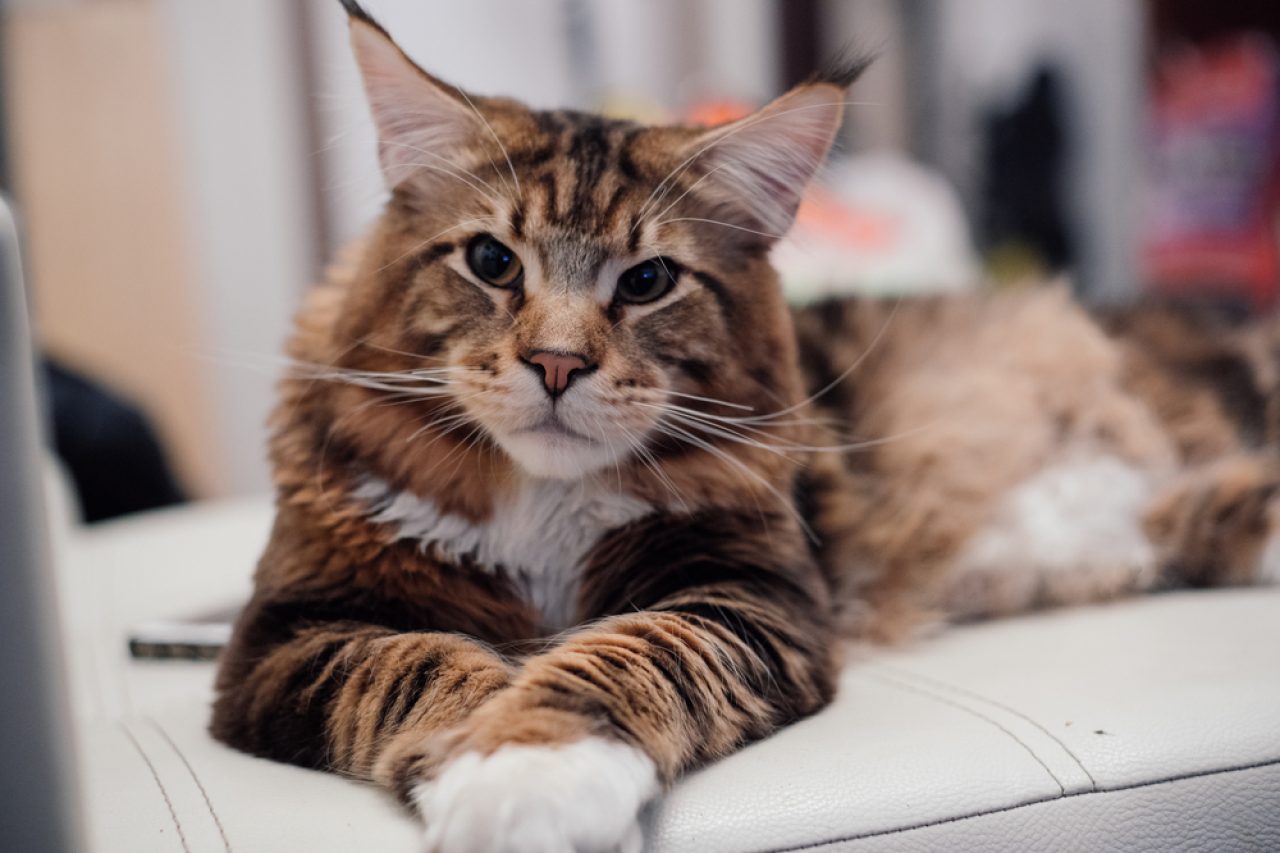
We hated breaking the news that Maine Coons are not hypoallergenic. Although frankly, we’re confused that there’s a myth they are in the first place. Maine Coons can’t even walk into a room without leaving a trail of fluff in their wake.
Anyway, when trying to figure out whether an animal is hypoallergenic or not, you ought to consider TWO things. Firstly, we have the pesky Fel d 1 protein that’s responsible for that stuffy nose of yours.
Certain breeds are believed to secrete lower levels of this protein, making them a safer option for humans who suffer from allergies. Siamese, Russian Blues, Bengals, and Siberians are the breeds that most allergy-prone cat lovers go for (without returning them to the shelter or giving them away to someone else).
On the other hand, we can’t forget about the fluff that’s flying around the already-mentioned mucous. Certain breeds trigger fewer reactions because they don’t shed as much and don’t possess as much fur.
Maine Coons secrete average amounts of Fel d 1 and go through the shedding phase twice a year. This is pretty on par with other cats. That’s not to say that humans with allergies can’t keep Maine Coons, though.
Most symptoms such as sneezing, drooling, runny nose, throat and mouth irritations, and watery eyes go away the moment you start taking medications or start following a meticulous Maine Coon care regimen.
It goes without saying, however, that humans with allergies shouldn’t keep Maine Coons if their symptoms become much more severe and cause anaphylaxis. Symptoms you shouldn’t ignore under any circumstances include swelling, rashes and hives, vomiting and diarrhea, asthma, difficulty breathing, and loss of consciousness.
Living with Maine Coons if you have allergies: Tips and tricks to make life easier
“Are Maine Coon hypoallergenic? – I asked my friend who’s a vet if this was true, and I was certain the answer would be yes. That’s why I decided to get one but it turned out that I spent the entirety of my life believing a lie.“
Sneezing and wheezing whenever you’re hanging out with your four-legged friend tends to take the fun out of what was supposed to be a lustrous living arrangement.
But your Maine Coon had to be the one to never cease leaving her dander, gunk, and hair everywhere she goes. She needs a Roomba running after her 24/7! And, finding out that Maine Coons aren’t actually hypoallergenic doesn’t seem to be doing her any favors.
Don’t worry, we’re not here to beg you to give up your troublemaker because of the sneeze fest. We’re here to give you the scoop on what you’re supposed to be doing YESTERDAY to make sure the two of you can continue living under the same roof for a long, long time.
1. Brush your Maine Coon regularly
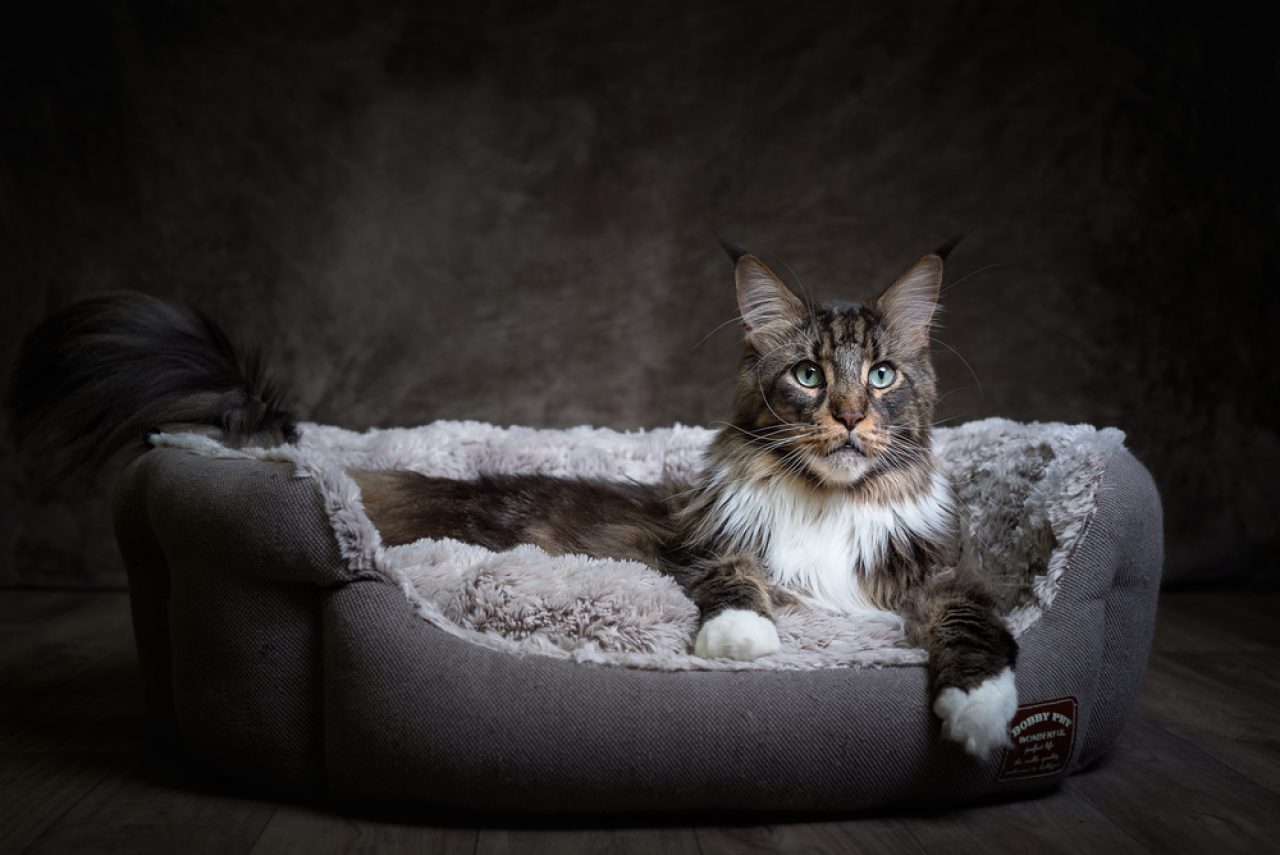
Maine Coons absolutely adore grooming themselves. These beautiful beasts spend hours and hours each day licking and cleaning every little fluff and every bean. But, that’s not to say that they don’t need a little push in the right direction.
Coons possess a lot of fur that needs to be cleaned regularly regardless of the circumstances. But if you’re all bunged up every time you catch a whiff of her fluffy tail, you need to take care of the brushing, grooming, and cleaning.
Brushing your Coon’s fur every single day should help with shedding. Shedding isn’t the only reason for the symptoms you’re experiencing when you’re around your cat. But you can’t go wrong with minimizing the amount of fur and fluff flying around the apartment.
2. Don’t let your Maine Coon lick you
Cats ADORE licking their humans for different reasons. “Does she think she needs to clean my skin? Does she do that because she’s trying to show affection?” – well, you’re pretty close.
While cats (Coons included) love licking their humans because they see that as a form of grooming, there are other reasons you should consider. Cats don’t really have an array of ways in which they can show love, affection, and gratitude.
Cats lick their kittens, and when they lick you, they’re essentially telling you, “You’re family – you deserve a lick of love!” But… because Maine Coon cats are NOT hypoallergenic, you should avoid getting letting them lick you.
Maine Coon saliva could contain a fair amount of Fel d 1, which seems to be the main culprit for allergy flair-ups. And, the best way to avoid such occurrences (according to the internet) seems to be to scream “No, God no!” whenever she gives it a shot.
3. Avoid petting her while she’s sweaty
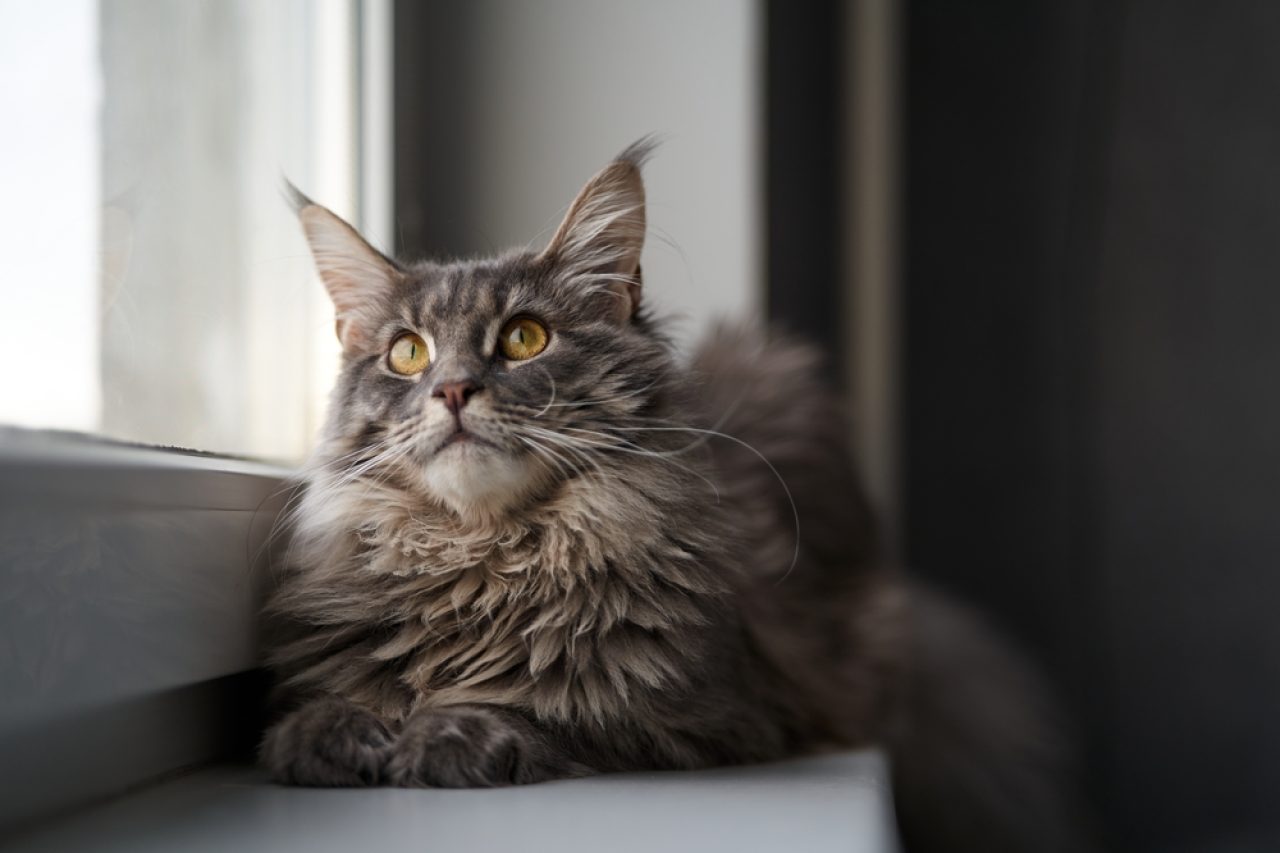
Okay, I hear you: “Ew, why would you want to pet a sweaty cat!?” Other than that, when you’re a parent to a Maine Coon kitten, you soon realize she’s one of the most fun-loving, energetic creatures you’ve ever had the pleasure of hanging out with.
She’s constantly running around the apartment, climbing on shelves and bookcases, and knocking things down. Needless to say, she’s sweaty for most of her running escapades, and you’re responsible for stopping yourself whenever you feel that “She’s so adorable, I need to squish her!” moment coming up.
Sweat doesn’t lack the Fel d 1 protein, and the only way of getting rid of the Fel d 1 seems to be bathing. Sure, Coons aren’t afraid of water like most tabby cats. But, that’s not to say that they would appreciate bathing every single day. Your best bet is to avoid her while she’s heated and hope for a miracle.
4. ALWAYS wash your hands after petting her
That goes without saying. You should always wash your hands after petting ANY cat because you never know what’s hiding underneath her fluff. Bacteria, parasites, and the Fel d 1 proteins can send you to the ER if you’re not paying enough attention to the signs and symptoms.
By washing your hands after petting your Maine Coon, those proteins don’t stay on your skin wreaking allergenic havoc. Word of advice? Splurge on a high-quality soap (maybe a cat dander remover) that can get rid of harmful pathogens.
Another tidbit: Brush, groom, and pet your Maine Coon outside. You might be taking every single precaution under the sun. But who’s to say some of that fluff, dander, and protein won’t end up on your bed sheets, your favorite pillow, or even your phone!?
5. Use gloves and a mask whenever you’re cleaning after her
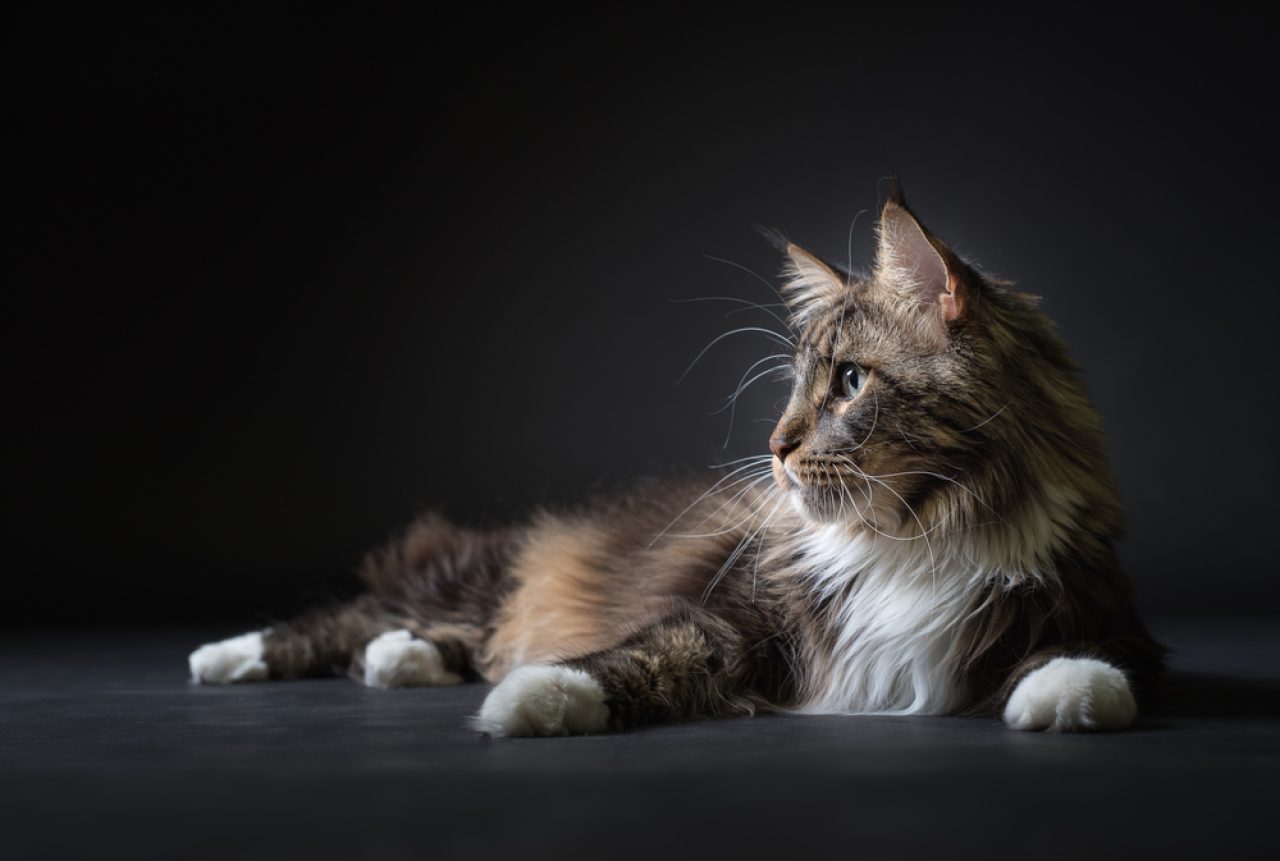
“What do you mean I need to get a set of gloves and a mask? Am I supposed to wear them every time I’m hanging out with my Maine Coon!?”
Worry not; we’re not here to make you feel like a germaphobe. But, grooming, brushing, and cleaning after you Coon might require stepping out of your comfort zone.
You have to understand that the only way to keep your allergies under control is to steer clear of your Coon’s saliva, urine, feces, and other sources of the Fel d 1 protein. You can do that by avoiding your Coon altogether, OR by wearing gloves and a mask whenever you’re grooming her.
And, you might want to do the same whenever you’re working in the garden (you never know where she might have done her business), cleaning her litterbox (those dust particles could be carrying the Fel d 1 protein), and even cleaning anything else in your apartment. (Fluff! Fluff everywhere!)
6. Make someone else clean after her
Wouldn’t that be a great way to get out of cleaning duty!? “Honey, would you mind cleaning the litterbox? My allergies are acting up again.” And suddenly you have the evening off to drink mimosas and watch your favorite Netflix show (Bridgerton, of course!)
With those attempts at making a stressful situation humorous aside, you might want to consider letting someone else take the Maine Coon cleaning duties. You shouldn’t take your allergies lightly. Who’s to say that one moment of extreme fluff attack won’t result in anaphylactic shock!?
Have your partner, sister, or friend clean after your Maine Coon for a couple of days and see what happens. Chances are, you should start noticing your sinuses clearing out, the swelling around your eyes going down, and your sneezing becoming a thing of the past.
7. Clean everything she touches
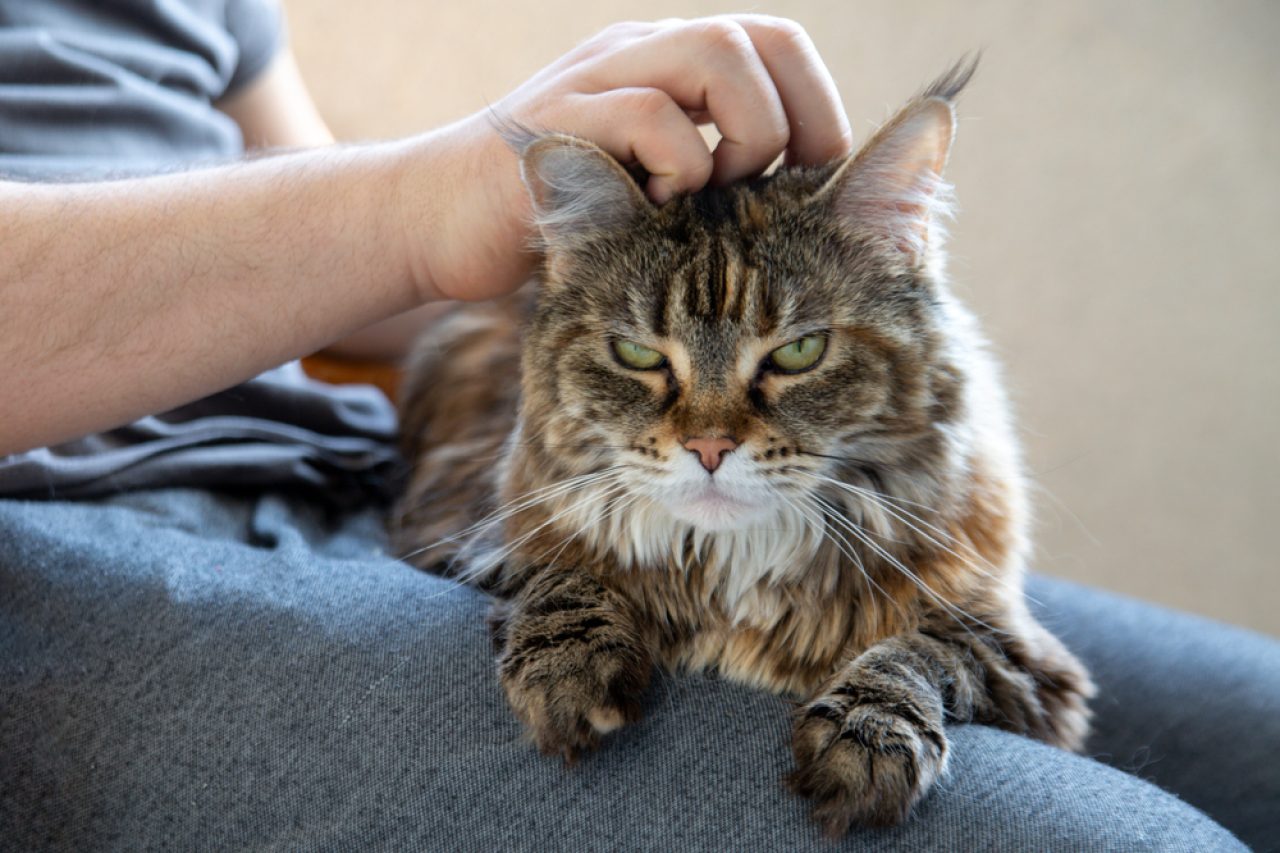
“Clean everything she touches? Isn’t that going a little overboard?” Here’s the thing. You aren’t likely to get better as long as you are exposed to that Fel d 1 protein. It’s your choice: You can continue living the way you did before while your symptoms keep getting worse, or…
You can start cleaning everything your Maine Coon touches. Make sure you vacuum every room she’s graced with her presence. Wipe down the floors and wash the rugs, blankets, and pillows. Make sure you don’t forget anything. The more you clean, the less of a chance you have for that Fel d 1 to enter your system.
You might even want to use a HEPA filter on your vacuum. Apparently, this air filter removes up to 99.97% of nasties and airborne particles, and that’s definitely something you could use.
8. Train your Maine Coon
“What does jumping up and down, rolling around, and sitting when told to sit have to do with anything? Maine Coon cats aren’t hypoallergenic. I don’t see how training them can make them any less detrimental to my health.”
When we say “training,” we aren’t talking about teaching her how to stand on two paws. We’re talking about teaching where she may and may not sit and sleep. We’re talking about teaching her which rooms she’s allowed to go in and which she should avoid.
Setting boundaries and teaching your cat how to respect them can minimize the amount of work needed to keep your apartment (and your cat) clean. And, at the same time, you’re minimizing the pawsibility of those Fel d 1 proteins entering your system.
9. Use over-the-counter cat sprays and wipes to remove dander
There’s nothing quite as efficient as cleaning everything your Maine Coon’s been touching with warm water and soap. You’re already planning on taking the day off, inviting a couple of your closest friends to help you out, and scrubbing everything down from head to toe.
But, there are times when you can’t afford to take the day off to organize a spring cleaning session. Now, those are the times that require over-the-counter cat sprays like this one from Burt’s Bees. Spray down the floors, the tables, the rugs, and pretty much anything she’s put her paws on, and wipe down the rest.
These over-the-counter products might sound gimmicky. But, they’re pretty handy when you’re sitting on a powder keg (meaning, you’re running out of time, for those of you who were born after the Civil War).
10. Consider getting proper medication
And, how can we forget about the most important step when learning how to live with your Maine Coon without getting in trouble? Consulting with your doctor and getting proper medication to deal with your allergies seems to be the best way to go about it.
Make sure you let your doctor know the details about your allergies – what makes you flare up the most, how you react to dander, saliva, and fluff, and what type of symptoms you experience every time your Maine Coon enters the room.
Your doctor should be able to provide you with something that’s bound to make you suffer a little less. That way, you get to have a little more fun with your four-legged friend.
What’s the verdict: Are Maine Coon hypoallergenic?
Maine Coon aren’t hypoallergenic and nobody’s surprised to learn that! Come on, these gentle giants are covered with heaps and heaps of fluff that’s potentially hiding sweat, dander, and Fel d 1 protein. Getting either of these things inside of your system means spending the rest of the day drooling, wheezing, and sneezing.
But, that’s not to say that you won’t be able to live a happy and healthy life with your Maine Coon. Use the tips and tricks we’ve gathered for you and the two of you can have many cheery years together!
